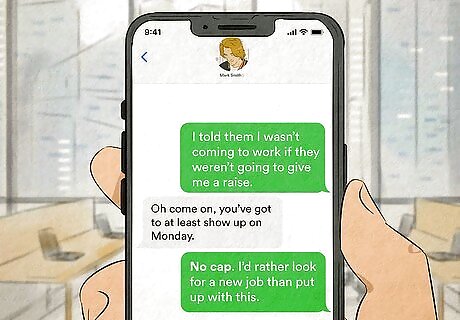
views
- “No cap” means “no lie,” or, “I’m serious.” It’s a way to emphasize that you aren’t exaggerating.
- Use “no cap” to stop haters who don’t believe you or back up friends making arguments you agree with.
- “No cap” probably comes from the usage of “cap” for “limit” (i.e. a “salary cap” referring to a limit on salaries).
No Cap Meaning

“No cap” means “no lie” or “for real." “No cap” is a slang term that basically means “I’m not lying.” To most teens, it's a playful way to emphasize that you’re not telling a fib. It can also be used as a funny way to support something someone else has said. If someone says something you agree with, following up with "No cap" is like saying, "yes, true!" People often drop the “no” and just say “cap” to mean “you’re lying” or “get out of here.” Like, someone might say, “I just got into Harvard!” and you might say, “That’s cap!” as in, “No way!” People will also use the ???? (blue hat) emoji to stand in for “cap.” As a note, “cap” is a common piece of slang in urban areas and among people who use African-American Vernacular English (AAVE). If you aren’t from a background where this kind of speech is common or natural, you may catch some flack or side eye.
How to Use No Cap

Throw a “no cap” out when someone questions you. If you’re talking to someone and they give you a little bit of side eye or suggest that you might be overblowing something, say “no cap” to let them know you’re serious. For example: You: “I told them I wasn’t coming to work if they weren’t going to give me a raise.” Them: “Oh come on, you’ve got to at least show up on Monday.” You: “No cap. I’d rather look for a new job than put up with this.”

Use “no cap” to emphasize how true something is. You can drop a “no cap” in the middle of a comment or speech to really drive home how serious you are. This is an easy way to make sure people don’t think you’re being dramatic and to back up your claims. You might say: “I’m on a rampage on the court. I’m going to put up 30 points next game, no cap.” “No cap, if Julia calls me again and she doesn’t have my money, it’s going to be a problem.” “People think I’m a pushover, but I’ll throw down if I need to and that’s no cap.”

Drop a “no cap” to casually encourage someone as they’re talking. “No cap” is also a popular way of throwing some love at someone who’s flexing or making an argument you agree with. If you want to show someone some love, you might say something like: Them: “People who really think LeBron is better than MJ just don’t know anything about basketball.” You: “No cap. Jordan was the goat.” Them: “That’s what I’m saying!”
Alternatives to No Cap

“On God” or "On my life" are old school alternatives. Originating in Chicago slang, this is an example of "marching" (which basically means “swearing on something sacred”). There are a lot of ways to do this: you might say “On my kids” or “On my life” as way of expressing that you’re serious and telling the truth. This phrase is used in the same way as "no cap." If you listen to hip hop (and drill music specifically), you’ll often hear the phrase “on foenem." This is another common example (it’s short for “foe and them”—the “foes” are a gang).

“For real” and “I’m serious” are also alternatives to "no cap." If you don’t want to offend anybody by dipping into some lingo that’s a touch outside of your life experience or natural speech, just say “for real,” “I’m serious,” or “I’m being honest.” It’ll communicate the exact same thing without rubbing anyone the wrong way by dropping unnatural slang.
History of No Cap

The “cap” in “no cap” probably refers to a limitation. People may talk about a cap on the number of deer people are allowed to hunt each year, or a cap on the amount of carbs they can eat a day to stay keto. So, if people use “no cap” to mean “I’m not lying” in scenarios where they’re saying something potentially over the top, it makes sense that someone would make the connection. Another classic example is a “salary cap” in professional sports, which refers to the maximum amount of money a single player can be paid.

The term was popularized in 2017 by Young Thug and Future. Nobody knows exactly when the word “cap” became synonymous with “lie,” but the slang term blew up in 2017 after Future and Young Thug released “No Cap.” The song was a huge hit, and with a lot Migos tracks from the same year mentioning “cap” it spread like wildfire. Earlier references to “cap” can be found all the way back in Geto Boys and UGK’s music from the 1980s and 1990s.




















Comments
0 comment